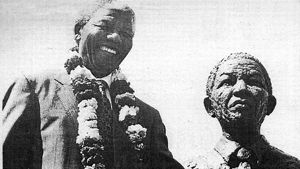
The world pays tribute to Mandela (slideshow)
As South Africans come to terms with the loss of former president Nelson Mandela, the rest of the world bids farewell to Madiba.

Pimples: Saving Madiba's rabbit (video)
Gwede, Mac and Blade try their best to stop the rabbit from whispering in Mandela's ear. But the elusive animal has some tricks up its sleeve.

Zapiro's best Madiba cartoons (slideshow)
From his toughest moments to his most triumphant, Madiba has been an inspiration. Here are some of our favourite Zapiro cartoons about him from 1994 to 2013.

Mandela: SA's greatest son laid to rest (slideshow)
The world watched as Nelson Mandela was finally laid to rest in his hometown of Qunu following a dignified and moving funeral ceremony on Sunday.

The Etwatwa community on the East Rand plans to turn the government's double shift "platoon" system on its head with its new "two of everything" school, officially launched this week.
On Monday African National Congress president Nelson Mandela opened the primary school, which bears his middle name -- Rolihlahla -- in the dusty little town near Daveyton.
A lively crowd of more than 5 000 people, young and old, gathered to watch him unveil a larger-than-life bust of himself, sculpted by Naomi Jacobson. Built in three months, the school is the result of a "social compact" between the Etwatwa Civic Association, the Independent Development Trust Nedcor and a Pretoria-based construction company, Citicon.
The Department of Education and Training has been drawn in to help with staffing, stationery and books. "In many respects Rolihlahla is symbolic of the co-operation we have been striving for between the state, the private sector and the community,” Education and Training Minister Sam de Beer told the gathering.
But in this project, the community is definitely in the driving seat -- a sense of ownership clearly felt by the festive atmosphere of the opening. It has followed the school's development from conception stage, making sure it is designed to meet its specific needs. Three years ago Etwatwa East was a neglected stretch of bare veld.
"Ours was a community deliberately sidelined, disowned and left to defend itself," said the chairman of the school's parent-teacher association, Chris Dhlamini. "All our basic needs were regarded by the regime as a luxury it could not afford."
The R2,2-million school project is an offshoot of Emaphupheni -- "place of dreams" -- the Perm's local housing scheme. Before the school was built, the area's 20 000 children were expected to squeeze into a farm school, one in neighbouring Etwatwa West which was already full and schools in Daveyton, eight kilometres away.
When the development partners realised that some 700 children could riot be accommodated in the initial school, they decided to put them together with the 111 qualified teachers "roaming the streets" -- and double up on the building. This was contrary to department regulations but, said fiery "activist principal" and local South African Democratic Teachers' Union chairman Mojalefa Mogane, "we cannot follow rules which don't help us".
Mpengesi Primary was opened as the second school and, "after a fight", the DET agreed to pay 10 extra teachers. Each of the 100 000-odd Etwatwa households have been asked to contribute R10 towards salaries for the seven still needed. "After repeated phone calls we lost confidence in the DET," said Mogane. "These teachers will be paid from community coffers."
So, in the morning, the building is Rolihlahla, and in the afternoon it's Mpengesi. It has two administration blocks, two staffrooms, two storerooms, two sets of catering facilities. Soon, it hopes to open a day care centre -- so that toddlers on the afternoon shift can be supervised during free time rather than being left to their own devices at home.
Step by step, said Mogase, they are trying to iron out the creases in the platoon system -- which may in the medium-term be the only way to address the space shortage in black schools: use whatever infrastructure is available to capacity at all times of the day.
The IDT has allocated R300-million to a national school building programme to contribute towards meeting a backlog of at least 50 000 classrooms. It favours multi-purpose community learning centres along the lines of Etwatwa to extend educational access across different sectors of the community.

